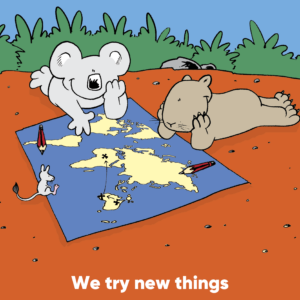Innovative Resources has been publishing strength-based card sets and books for more than 30 years.
Over that time—for all sorts of reasons—card sets fall by the wayside. Some lose their relevance because of social or cultural changes. Others date because of their design and illustration styles, or even changes in language.
BUT, some resources are stayers. They are so universally loved and make such an impact on the work and lives of the people who come in contact with them, they continue to evolve and be reinvented over time.
One of those is a set of cards first published in 2003 as Mates Traits—32 cards that explore the strengths that make great friendships. Twenty years on, this much-loved resource has been reimagined and redesigned as Respectful Relationships.
reimagined and redesigned as Respectful Relationships.
With 11 brand new cards and another 10 with updated wording, Respectful Relationships has a fresh new look and colour palette, but retains many of the Mates Traits characters (and a whole lot of new ones) illustrated by our own Mat Jones.
We think this rejuvenated resource is perfect for encouraging children to discover the foundations of healthy relationships and spark those important conversations about what makes great relationships tick, how we can model respectful relationships for our kids, and how diverse human relationships can be.
Over the years we’ve heard many stories highlighting the power of these cards to create conversations of meaning and hope. None have been more compelling than one from Nicole Rotaru, a Sister of Mercy who for more than a decade has travelled to Sudan each year to train student teachers and provide professional development for graduate teachers, and staff at the Mother of Mercy Hospital and the Voice of Peace radio station in the Nuba mountains.
The radio station had a staff of ten and Nicole was asked to lead a team-building session called ‘Come Live Into the Light’ with a focus on strengthening the team’s unity and appreciating its diversity. The aim was to strengthen the group by identifying their qualities and how they enhance the team.
‘As part of my facilitation, I used the Mates Traits cards,’ Nicole explained. ‘Each member was asked to choose one card that reflected a quality she or he believed was present in the group, and the cards were placed in a central space. Discussion about each quality followed and examples of each quality in action were given. Following the discussion, members placed the cards in order of priority—the most important card to be placed at the top and others to follow.
 ‘One member of the group, who had been watching and listening quietly, finally spoke. “There is a card missing,” she said. I gave her a piece of paper and a texta to write the missing word. ‘‘Love’ is missing,” she said. “Without love the others cannot follow. She placed “love” at the top.
‘One member of the group, who had been watching and listening quietly, finally spoke. “There is a card missing,” she said. I gave her a piece of paper and a texta to write the missing word. ‘‘Love’ is missing,” she said. “Without love the others cannot follow. She placed “love” at the top.
‘Her reflection stopped us all in our tracks. There was silence, then a long pause. Her comment resonated with everyone.
‘After a time, discussion resumed, but at a deeper level. Issues that had been part of the team were named, and ordering and reordering of the cards followed. This time, the reasons given reflected more authentically the strengths of the team—strengths that were born of the angst and misunderstandings they had struggled through. The final ordering of the cards was agreed a much truer reflection of the team.
‘As I think again about that final selection of Mates Traits cards made by the Voice of Peace team, I’m reminded that the power of the human spirit can transcend extreme adversity to find meaning and hope. The human spirit is far stronger than adversity.
‘For this group of Nuba people, their personal struggles with conflict and anguish while living in a war zone of complete chaos, utter de-stabilisation and untold suffering brought them to choose “Love” as the key to trust, to share and to forgive.’
Respectful Relationships is a powerful resource. As Nicole related, the cards enabled staff at the radio station to recall and articulate experiences and have rich discussion.
‘The captions on the cards along with the directness and simplicity of the characters’ expressions really spoke to the group,’ Nicole said. ‘Many of the drawings brought smiles and laughter. And while the images are not necessarily part of their lived experience, they still widened and brightened the world of the Nuba people.’

